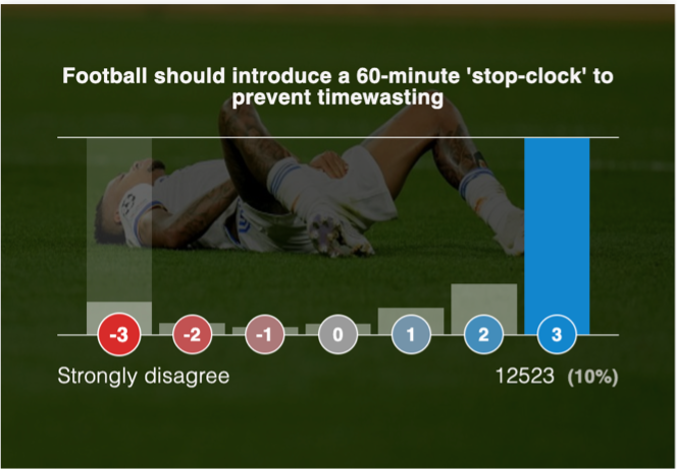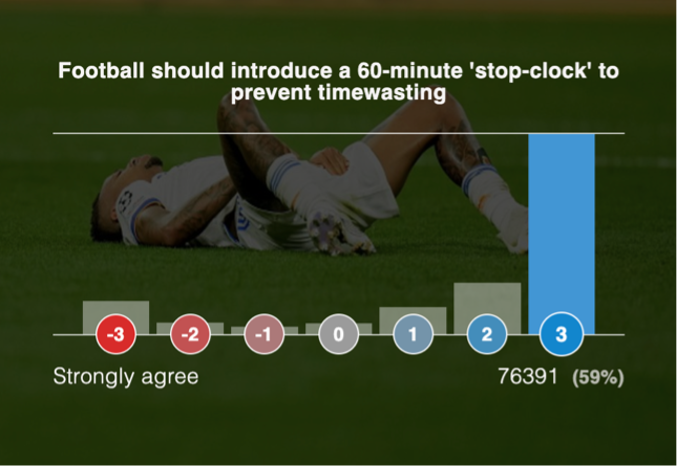Can the stop-clock improve modern football?
If you are a football fan, I am sure you’re tired of one repeated matter: time-wasting.
Throw-ins, corner kicks, substitutions, hydration breaks, celebrations, feigned injuries, deliberate time-wasting, VAR checks and drama… What do we need? Harsher referees? Changing players’ behaviour? Stop the clock like in basketball, futsal, and many other sports?
Time-wasting is considered by many to be unsportsmanlike, especially when the opposing team does so. It’s seen as something that goes against the essence of football. However, it’s nearly a player’s obligation to use the established rules to maintain a result that is favourable to his team.
With football entering the VAR era, the written rules need to be a lot clearer. The law surrounding handball continues to frustrate fans, as does the constant diving without any consequences, while interpretations of the offside law can be confusing to everyone.
Let’s get into the main topic: the way a football match is timed is ridiculous.
According to the “Rules of the Game”, published by the International Football Association Board (IFAB), the referee must decide on added time having regard to: “substitutions; assessment and/or removal of injured players; wasting time; disciplinary sanctions; medical stoppages, ‘cooling’ breaks; delays relating to VAR ‘checks’ and ‘reviews’; goal celebrations; any other cause, including any significant delay to a restart”.
So, does the main referee have to stop his clock each time one of these events happen? And at the same time trying to control and referee the game? Impossible.
Why can’t someone from the VAR’s room oversee it?
Right now, referees in the Premier League, and nearly every European national league, have been instructed to calculate time lost more accurately. The goal is to clamp down on time-wasting and increase effective playing time, to “create fairer conditions for both teams in terms of the amount of time available in a match”, according to the IFAB. This approach was first adopted at the men’s 2022 World Cup in Qatar, causing an average per game of 10 minutes and 11 seconds of additional time.
Pierluigi Collina, chairman of FIFA’s referee’s committee said, “What we want to avoid is to have a match with 42, 43, 44, 45 minutes of active play. This is not acceptable.”
Did it work?
According to the game’s world governing body FIFA, while added time was up in Qatar compared to Russia in 2018, effective playing time increased from 55 minutes and 41 seconds in Russia to 59 minutes and 47 seconds in Qatar.
Four more minutes of effective playing time, but what about the players? Global players’ union FIFPRO said these changes could equate to three extra games per season for the top players. Maybe that’s why European competitions are not using this approach, for the sake of the players. What’s more, UEFA’s chief of football Zvonimir Boban rates these new rules as “absurd”.
In addition, according to a recent study by insurance group Howden, a World Cup in the winter like the last one in Qatar significantly increases the risk and the severity of injuries in the months after the tournament. All these injuries during the recent international break are the clear example of it.
ESPN UK posted a statistic that injuries in the Premier League at this stage of the season had risen by 15% in comparison to the previous four campaigns. Top footballers nowadays play too many games, and these new rules don’t help.
Jules Koundé, FC Barcelona player and French international, talked recently about this problem, saying, “There are too many games. The pace has become more and more intense… and so too many injuries”, then concluded, “We should be careful for the future of the game”.
The Spanish La Liga is the competition with the least effective playing time between the top 5 European leagues. According to Spanish media, La COPE, last season, the ball was in motion in only 54.4% of the total minutes of the average match. The Premier League was relatively close behind with 56%.
Manuel Pellegrini, Real Betis’ coach, said that a solution should be found to solve the time-wasting problem: “The referees cannot allow the players to take so long. La Liga is the slowest in Europe.” He added, “Either we take care of this, or it goes against the spectacle, people pay a ticket for something.”
Some time ago, former La Liga coach José Luis Mendilibar blasted the entire competition: “In La Liga, we are a bunch of cheats”.
In fact, Spain is the league with the most fouls per game, because any contact is given as a foul. Leeds United’s scout in Spain, Paco Peral, shared his opinion about it, “Spanish referees stop plays for things that other leagues don’t even consider. Why? Because any contact is whistled.”
Eintracht Frankfurt’s scout in Spain, José Viñas, shares Peral’s view and adds: “Contact is a part of the game. What you can’t do is call a foul for any touch because then you damage the spectacle. The footballer is smart and adapts.”
This is not only a problem in La Liga, even if it’s worse than the Premier League, the last one can also see some improvement in terms of effective playing time. The same goes for the Champions League and any football competition in the world.
BBC showed the difference between the effective playing time in the top five European leagues and the Champions League during the 2021-2022 season. As expected, the Champions League came on top, with the ball being played in 59.2% of the match. Nevertheless, it was just under 5% more than the worst average, La Liga, with 54.6%.
During the 90 minutes plus added time, the ball is nearly never played for more than 60 minutes. The main problem is the irregularity. Matches have differing durations of the ball being in play, and that’s unfair. To the losing team, it’s time-wasting. To those leading, it’s smart game management.
But why can’t we change something so every team plays the same minutes?
If we don’t change anything, coaches like José Bordalás and José Mourinho are going to keep taking advantage of the rules to win, and we can’t blame them.
Real Madrid’s coach, Carlo Ancelotti, also complained about how long some games can be and how little time the ball is in play. Netherlands’ legend Marco van Basten, ex-Premier League referee Mark Clattenburg and former Arsenal chief David Dein have suggested football becomes a 60-minute sport, with the clock stopping every time the ball is out of play.
Clattenburg stated, “It works in basketball, and it could work in football, too.”.
This would be a huge change; it would make it easier for the referees and it would solve the injustice between matches. While broadcasters may see advertising opportunities in the clock stopping when the ball isn’t being played, like the NBA, turning football into a festival of interruptions could face significant backlash.
Both the BBC and Marca, two of the most read media outlets in Spain and the UK, they did a survey for their readers and the results are surprisingly different.


Source: BBC
BBC readers are strongly in favour of introducing a 60-minute “stop-clock” to prevent time-wasting, with 59% strongly agreeing and 10% strongly disagreeing.
On the other hand, Marca readers are quite divided in their opinions. Among the nearly 90,000 participants, 51% voted “yes”, because it “would put an end to time-wasting”, and 49% voted “no”, because “we would lose football’s spice”.

Source: Marca
Quite a few football coaches agreed with this idea. One of them is FC Barcelona’s coach, Xavi Hernández, stating, “I see it as a fantastic solution, to avoid debates about injury faking and unnecessary time wasting. In the end, playing with the score is fine, everybody does it and it’s legal, but playing football. I mean, I find it cheating to play to waste time. If you want to waste time, play football.”
Former Villareal’s head coach, Jose Rojo Martin “Pacheta” concluded about the 60-minutes stop-clock idea, “It removes the problem in one fell swoop.”
Time-wasting is annoying for everyone, fans, coaches, and players. Extend the games is not the right solution, neither a rule like the 30-seconds timer to avoid fake injuries. The player’s health is obviously key, and the effective playing time must be the same for every team.
Can the 60-minutes stop-clock game be the right way to solve these problems?